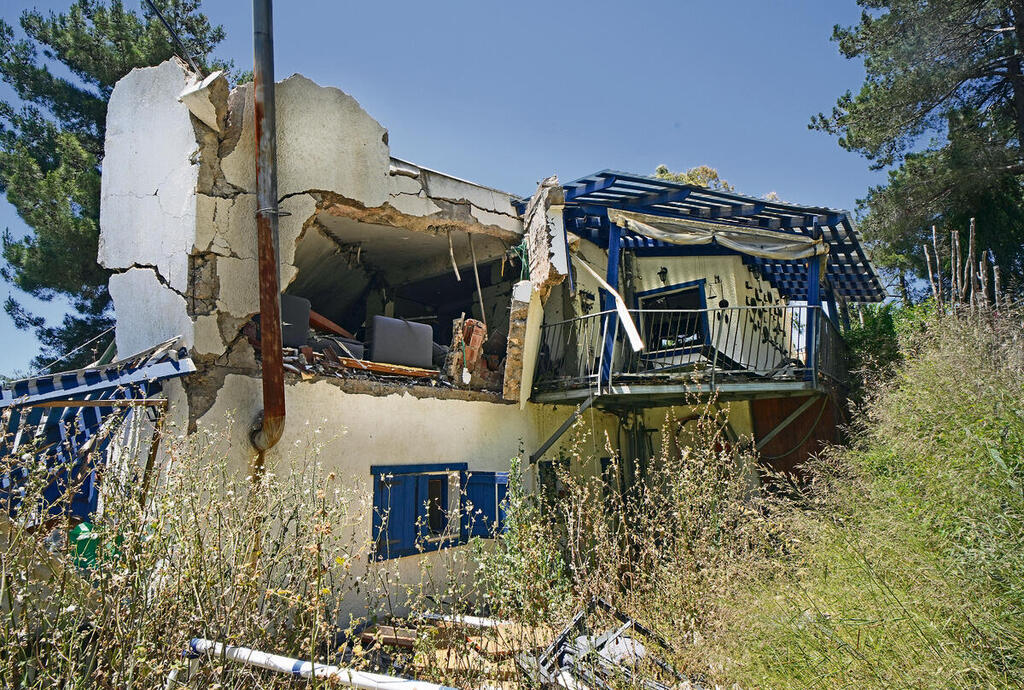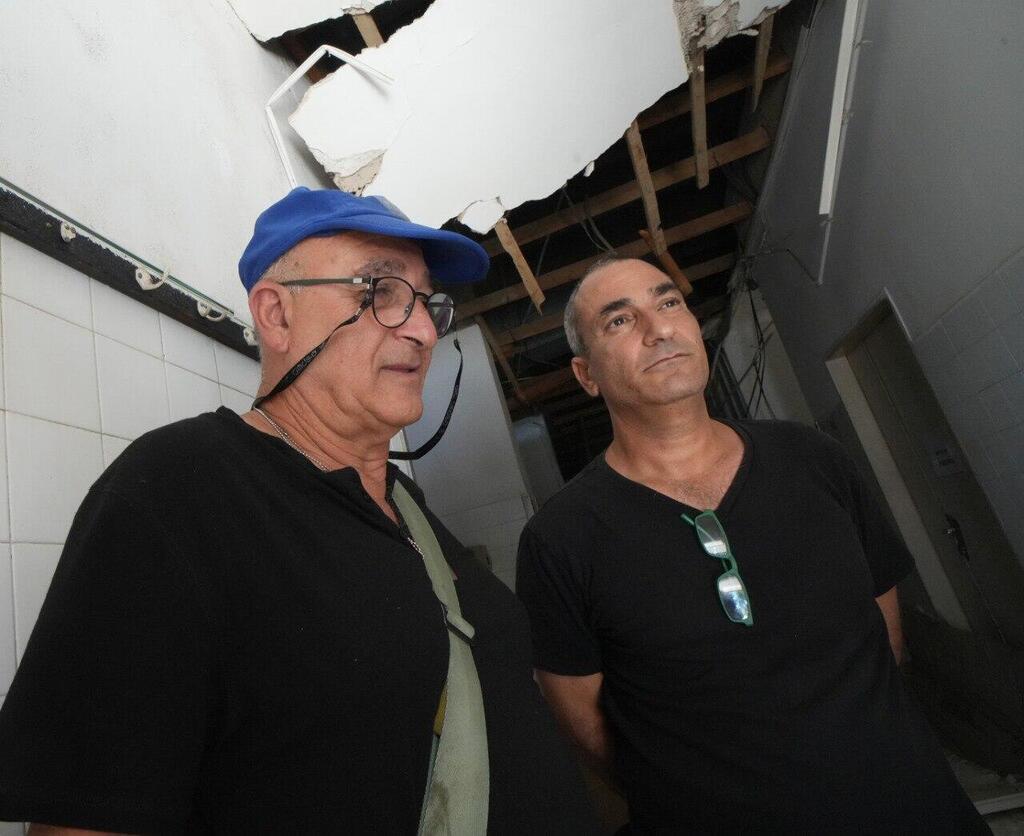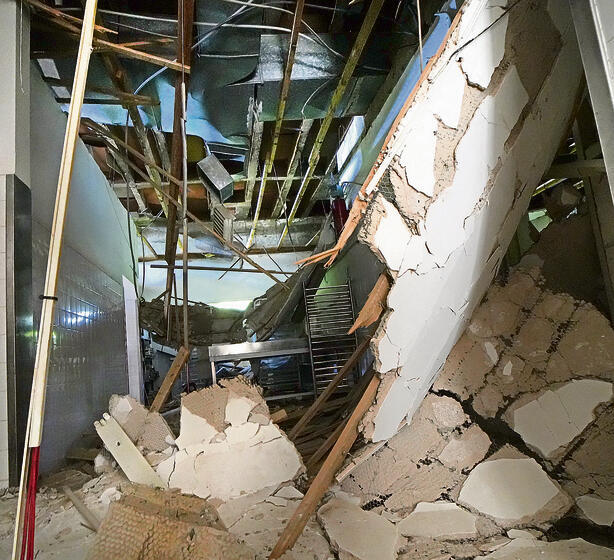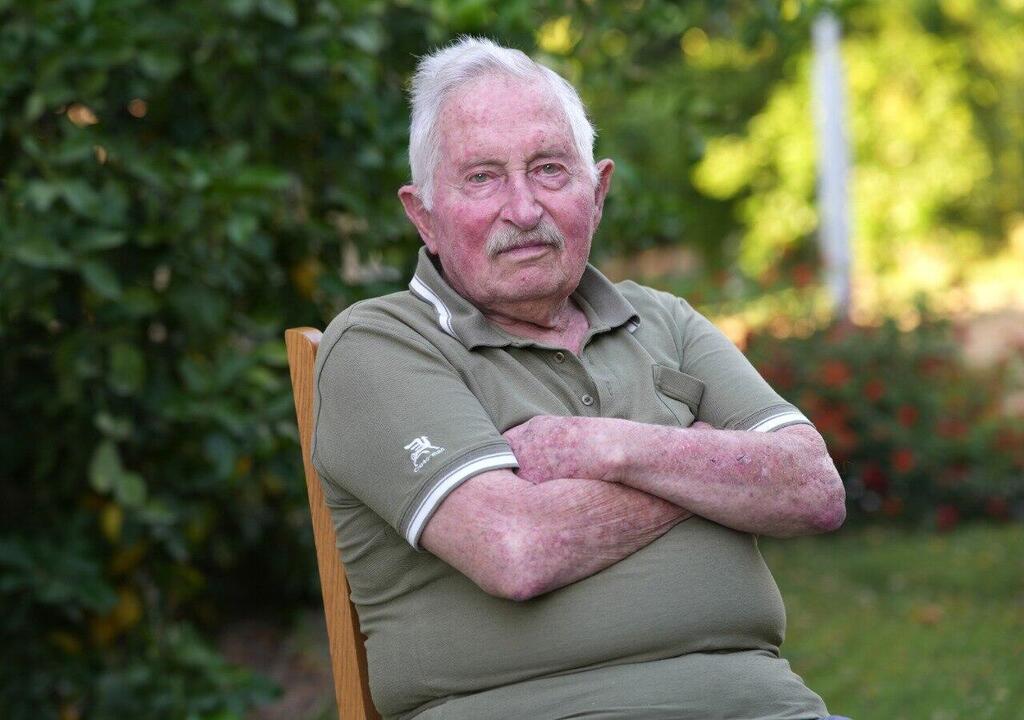Getting your Trinity Audio player ready...
Eight months into the war, a team from Ynet and sister publication Yedioth Ahronoth visited Kibbutz Manara on the northern border. Amid the smoke from fires, they heard the stories of those who remain despite the imminent danger from ceaseless Hezbollah attacks.
The gate of Manara’s swimming pool is locked with a simple chain, the type you can buy at any hardware store. Slipping through a gap in the fence, the team found themselves in a time capsule. Locals jokingly call it “The Millionaires' Pool,” referencing former Prime Minister Menachem Begin’s remark about kibbutzim having swimming pools as opposed to low-income urban areas. The phrase originated after a television report showed a Manara resident leisurely swimming after a grueling workday. Today, eight months since the kibbutz was evacuated, the water is green and stale.
A small sign on the stone wall reads: “Swimming Pool in Memory of Nehemiah Rabin, of blessed memory,” the father of the late Prime Minister Yitzhak Rabin and his sister Rachel Rabin Yaakon, a long-time Manara resident who now lives in an assisted living facility in Kibbutz Kinneret. “She would always say: ‘There is no leadership, there is NO leadership,’” recounted Hagit Erlich, the kibbutz’s welfare coordinator.
Once a symbol of political struggle between the right and the left, Manara now epitomizes the abandonment of northern border residents, regardless of their political views. Positioned on the mountainside facing Lebanon, the kibbutz has become a target for incessant rocket fire. About two-thirds of the apartments have been damaged, ranging from shattered windows to complete destruction, and part of the kibbutz has been declared a closed military zone, now blocked off with barbed wire.
Aside from the community's alert squad, only two residents remain: Moti Shai, head of the sanitation department in the Upper Galilee Regional Council, and Naor Shamia, head of the local alert squad and a math and physics teacher. The team met Shai at the Ko’ah junction and ascended to Manara together, joined by Shamia. The road, scarred by the treads of tanks and APCs, will require significant funds and effort to restore. However, this pales in comparison to the resources needed to rehabilitate the town itself.
The picturesque journey to Manara, marred by the smoke from fires, revealed a kibbutz in dire need of attention and support. The once-thriving community now stands as a stark reminder of the costs of war and the urgent need for rehabilitation efforts.
Moti and Naor take us into the dining room, where three anti-tank missiles hit the kitchen and destroyed it completely. “The dining room is an institution in a kibbutz, a secular synagogue,” Moti said. “The brick and mortar can be rebuilt, but it's more important to see how and when the people will be brought back. I hope the government will help with the reconstruction and not shirk its responsibility.”
In one apartment, a refrigerator stands open, packed with rotting food. After eight months, you no longer notice the stench. Below the window, which was used as a firing position, bullet casings are scattered.
The evacuated residents will return only when security is restored, said Naor. “Not the sense of security, actual security,” he emphasized, noting that he does not know how it could be achieved. “I am not a general. That is what the army is for.” Moti added that the government is not involved. “It doesn't exist. Right now, there is no such thing as a ‘government’,” he said.
Naor was raised in Holon and lived there for most of his life. In 2011, he moved to Manara. “I couldn't live any longer in the concrete jungle of Gush Dan,” he explained. Now, he looks at the ruined kibbutz, the destroyed roads, the wild-growing weeds, and cannot believe it. “They destroyed our kibbutz.”
We continue to walk along Manara’s streets. “If you hear a siren, drop on the ground,” Moti warned. He leads us to a residential building that has been razed to the ground. Naor was the one to call the displaced owners to inform them that their house had been destroyed. “They took it very hard,” he said. “We’re talking about a couple in their 80s. There's no way they can rebuild their home. Their lives are over while they're still alive.”
Another destroyed house belongs to a bereaved family that lost two sons, one killed in an ambush by terrorists near Nablus in the West Bank, and the other during his military service. “The parents have already passed away,” Naor said. “We called their children and they told us, ‘Don’t go into the house so you don’t get hurt. No one was killed, everything is fine, at the end of the war we will talk.’”
In Manara, unlike other kibbutzim, there are old houses with four to five stories. We enter one of them, the stairway filled with broken glass. In one apartment, a refrigerator stands open, packed with rotting food. After eight months, you no longer notice the stench. Below the window, which was used as a firing position, bullet casings are scattered.
The heart is in Manara, the (new) home is in Gadot
About 60 of Manara’s displaced residents now live in the resort village of Gadot, where they were relocated with the help of the Upper Galilee Regional Council. Another 20 residents, mainly elderly, are in Nof Kinneret. The rest are spread from the Hula Valley to the Arava.
Orna Weinberg, a second-generation resident of Manara, told us, “At the start of the war, I had to evacuate my mother to a nursing home at Kibbutz Kinneret. She is 93, has lived in Manara since 1948, and never dreamed anyone would tell her to leave. I said I was willing to live in a trench or a hole, as long as they let me stay. But we were forced to leave.”
Only after two weeks, when a neighboring house suffered a direct hit, did Orna agree to evacuate. About 280 people lived in Manara on the eve of the war. On October 8, the regional council recommended an evacuation.
"I have been through two evacuations. Hosting the evacuees from Manara is, for me, closure"
“At 9:00 in the morning, we sent the message to community members. It was a dramatic moment,” said Yochai Wolfin, Manara's community manager and a member of Kibbutz Kfar HaNasi. “We asked each family to tie a plastic bag to the door handle so we would know who has evacuated.”
When the state declared an official evacuation, Manara residents were already scattered across the country. “Uncertainty is a centrifuge that throws everyone outward, and our mission is to create anchors that will bring the community back together,” said Wolfin. “We opened our kindergartens here, and just as importantly, our community institutions. People can live wherever they want, but they should know they have a home. We divided Manara into neighborhoods, and each neighborhood head maintains regular contact with their residents, no matter where they are. The community is like the etrog, and we are doing everything to preserve it.”
The veterans of Gadot vividly remember the shelling the kibbutz endured from Syrian outposts in the Golan Heights in the 50s and 60s. One of them is Uzi Gal, an 88-year-old blue-eyed man with a mustache and the memory of a computer. “I came here from Tel Aviv 70 years and two weeks ago with a group from the HaMachanot HaOlim movement,” he said. On April 7, 1967, after the Air Force shot down six Syrian planes, Gadot experienced the heaviest shelling in the community's history.
Gal experienced the trauma of evacuation twice. “Three days after the inception of the state, Egyptian planes bombed Tel Aviv,” he recalled. “We lived at 51 Nahmani Street, and two bombs hit nearby houses. We packed quickly and left home. For a month, I was a refugee. A decade later, on March 31, 1958, Gadot suffered a severe shelling in which a friend of mine from the movement was killed, and we evacuated the children, the caregivers and some mothers. So, I have been through two evacuations. Hosting the evacuees from Manara is, for me, closure.”
At the Nof Kinneret Hotel, we met three Manara elders, Danny Ilan, 87, Eli Moalem, 89, and Hagar Erlich, 71, who is a second-generation kibbutz resident. “My father was the core founder,” Hagar said. “He lived in Manara until his last day and died four years ago.” His portrait is emblazoned onto the beer bottles produced by Hagar’s son under the name Beerlich.
Danny grew up in Tel Aviv and came to Manara in 1958. Eli, born in Iraq, has been a Manara member for the past 68 years. His son Omri, a member of the alert squad, was injured by shrapnel from an anti-tank missile. “You don’t see the light at the end of the tunnel,” he said.
The north has been forsaken for years
Orna, who evacuated her mother, was fed up with the government. “The north has been forsaken for years: welfare, culture, education, health, employment. My son is a reservist in the Commando Brigade. He spent a few months fighting in Gaza and is now in the north. My youngest daughter is a combat soldier as well. It's not worth a hair falling from their heads if the state does not put their welfare and the welfare of their children first."
Another resident protested, "this is not happening because the government doesn't care. Right now we are all waiting for the hostages. If we go to war in the north, we will lose the hostages. Basically, to get a feeling of security we need scorched earth to the Litani River. They are shooting at us from inside a Lebanese village? Destroy them. That's the only way they learn. At the moment, it's been open season on us, and our army cannot respond.”
The day before, a meeting with former Kibbutz Manara members who wanted to come and help took place in Nof Kinneret. “They appeared before government ministries and explained how to plan the restoration of the kibbutz on a practical level," said Orna. Danny concluded, “you can leave Manara, but Manara will never leave you.”






